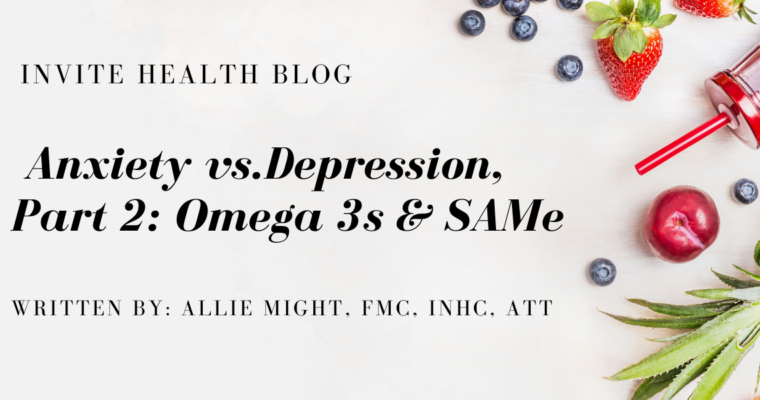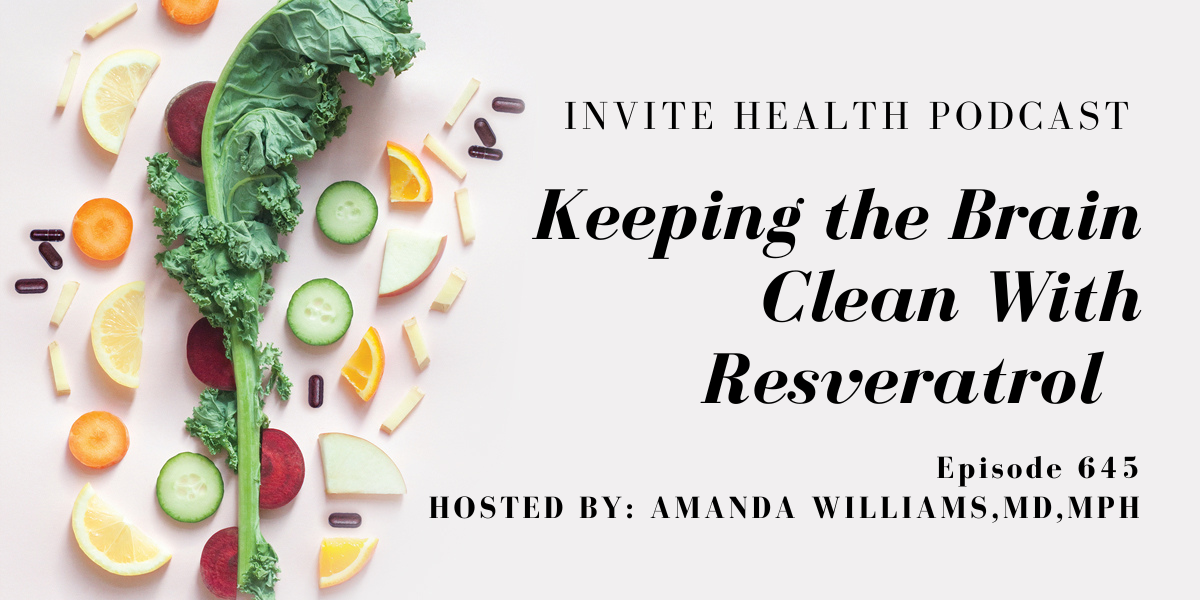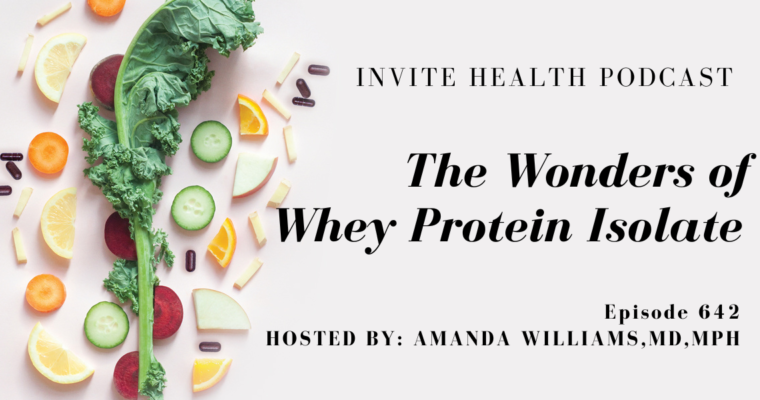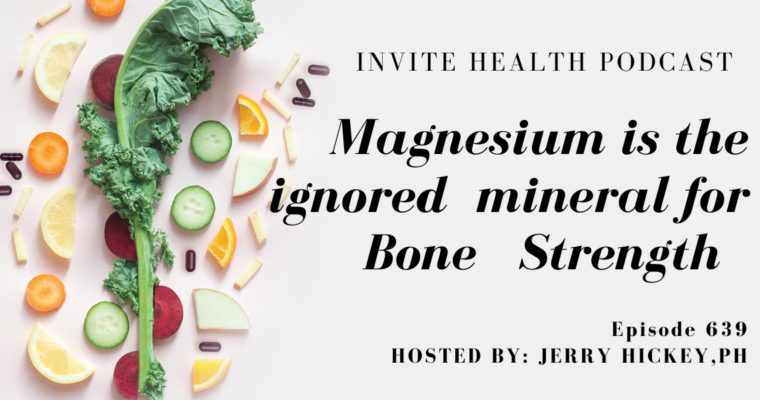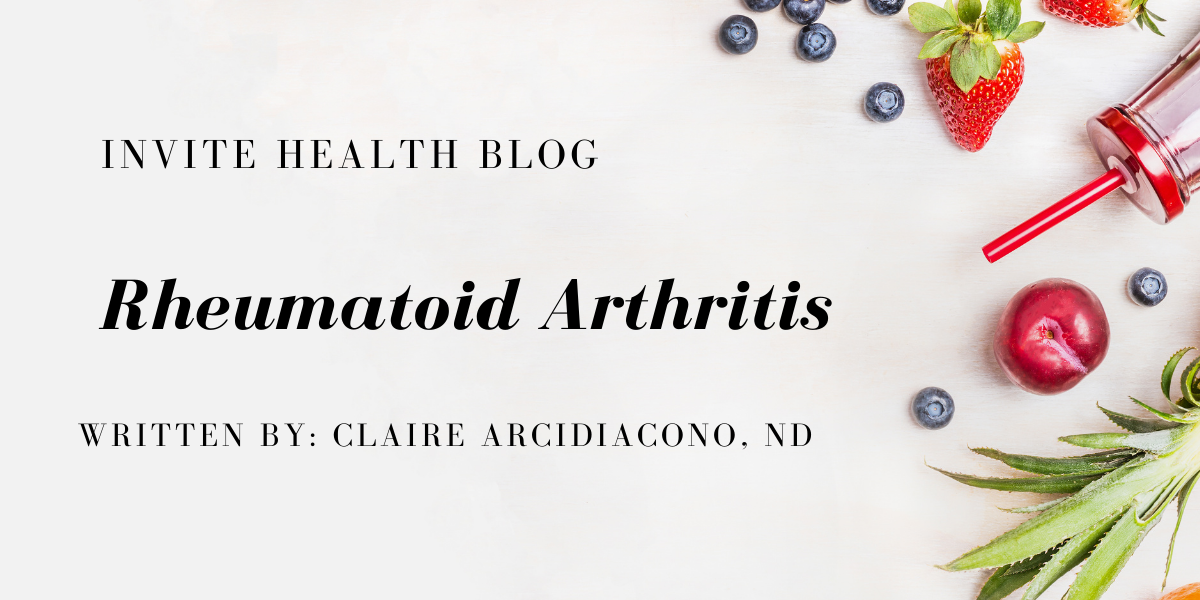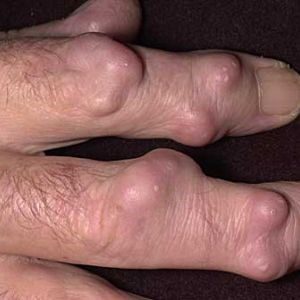Subscribe Today!
Please see below for a complete transcript of this episode.
KEEPING THE BRAIN CLEAN WITH RESVERATROL, INVITE HEALTH PODCAST, EPISODE 645
Hosted by Amanda Williams, MD, MPH

*Intro Music*
InViteⓇ Health Podcast Intro: [00:00:04] Welcome to the InViteⓇ Health Podcast, where our degreed health care professionals are excited to offer you the most important health and wellness information you need to make informed choices about your health. You can learn more about the products discussed in each of these episodes and all that Invite Health has to offer at, invitehealth.com/podcast. First time customers can use promo code, podcast at checkout for an additional 15% off your first purchase. Let’s get started.† [00:00:34]
*Intro Music*
Amanda Williams MD, MPH: [00:00:40] Have you ever walked down a really busy street, and as the cars are passing by, you can get that scent of the exhaust? We all recognize this. We know that pollution is not good for our body, but generally speaking, when you think about air pollution, we oftentimes think about the effects that that can have on our respiratory system. We clearly know that air pollution is affecting every single system in the human body. And that’s what I want to zero in on today, is the impact of air pollution when it comes to brain health and the aging effects on the brain. There’s more and more research that has come out over the past decade that has really reinforced why we need to zero in on cleaner air. It really does matter. So, I’m going to talk about that and talk about a very important supplement that you can add into your daily routine that helps with targeting all of that air pollution that can start to cloud up your brain. I’m Dr. Amanda Williams, scientific director at Invite Health, and when it comes to air pollution in the United States, we’re not doing too great. We know that we come in towards the bottom of all of the wealthy democracies across the globe ranked 24th of the major European countries are well ahead of us when it comes to clean air. We can see that through different steps and regulations, air quality has improved in some regards, but with every you know, two steps forward, we take one step back. And the majority of Americans live in areas where air pollution is receiving failing grades close to 40% of the U.S. population lives in areas that definitely have failing grades, and then everyone else is kind of kind of at that limbo stage. So, we know that the unhealthy levels of air pollution in this country have significant effects on our overall health. And oftentimes we don’t talk about this enough. I always zero in on making sure that we’re doing the right things when it comes to detoxification every day. † [00:03:03]
[00:03:04] Our bodies trying to filter through all of the gunk and grime that were exposed to. You know whether we’re breathing that in or of something that we’re touching or applying to our skin or something that we’re actually ingesting through the foods that we’re eating. But in any event, we know that a cluttered-up body can lead to significant health issues. We’ve seen studies where in major metropolitan areas such as New York City, that exposure to all of the exhaust leads to cardiac dysfunction and has a significant impact on B vitamin status, which is why if you live in a major metropolitan city, you should be taking methyl B one capsule of that bioactive b complex. each and every single day. But my primary focus today, is on brain health. I read through a really interesting study that came out recently, the University of California, San Diego, where they were looking at air pollution being an independent risk factor for dementia. They looked at other components to this, we know that there is genetic underpinnings and epigenetic changes within one’s environment throughout their life that can put at a greater risk of development of cognitive decline, dementia and Alzheimer’s disease. Apo E happens to be the one gene that they have been able to zero in on, and with an APO E genetic mutation, this can put you into a higher risk category. Now, we also offer Apo E genetic testing, so, if that’s something that you’re interested in, you can certainly check that out on our website or speak with one of our nutritionists. We can’t change our genes, but we can definitely make modifications to what we do every day to kind of skirt around that issue. In the Journal of Alzheimer’s disease, they looked at the effects of air pollution when it came to dementia, and this was led by a group of researchers out of the University of California, San Diego. They were looking at exposure to ambient air pollution, such as car exhaust, power plant emissions, defining measurable outcomes to really zero in on what those exposures led to when it came to the risk of developing significant cognitive decline. The fascinating part of this study was that they were using the information that they had obtained from over 1100 men who were participating in an ongoing Vietnam era twin study of aging and looking at different factors throughout these gentlemen’s lives and doing this overall follow up as they were aging. They looked at exposure to fine particulate matter in the air and nitrogen dioxide. Nitrogen dioxide is created when fossil fuels are burned. And they looked at the overall impact that this could potentially have on memory, on executive function, verbal skills, brain processing. But they also looked at Apo E and looking at that gene as being a very strong risk factor for the development of Alzheimer’s disease. Through this data extrapolation, they were able to determine that individuals who had higher levels of exposure to air pollution during their forties and fifties displayed significantly worse cognitive function by the time that they reached their late fifties and into their sixties. Now, those who had a double whammy effect also had that Apo E gene mutation. † [00:06:58]
ICYMI: INTRODUCTION TO BRAIN HEALTH & MEMORY, INVITE HEALTH BLOG>>READ NOW!
[00:07:01] So we know that there are many different things that we can do in terms of lifestyle modification. Clearly, if you live in an area that has high air pollution, you’re likely not to move, but what you can do is make better choices in terms of the foods that you’re eating to minimize additional toxic exposures and of course to make modifications in terms of the nutrients that you are supplementing with, as well as having good stress management skills. This is very important when it comes to the way that the brain ages. So, this takes me to resveratrol. Resveratrol often is thought of as the primary, anti-aging supplement, and it is for a variety of different reasons. We know that it works through cellular longevity by protecting the end caps of our chromosomes. But we also recognize that it has a lot of cardio-protective mechanisms to it. And then we get into how it works in the brain, and through its inhibition of neuroinflammation. This is very important, because if we have chronic exposure to higher levels of air pollution, this will drive up high amounts of free radicals or oxidative stress, which in turn will generate up more inflammation. So neuroinflammation, this low- grade inflammation that’s occurring in the brain, so what we can see through the clinical research trials is resveratrol, has this innate ability to inhibit the inflammatory response, in particular those inflammatory responses that are triggered by beta amyloid peptides. So, we think beta amyloid, we’re thinking Alzheimer’s disease, so we fast track this and we start to look at supplementation of resveratrol when it comes to protecting our brain as we get older. In the drugs and aging journal, they talk about this, they talk about the effects of resveratrol supplementation on cognitive function in patients who had Alzheimer’s disease. So, this is a very important study because you already have individuals who have been diagnosed with Alzheimer’s who are now being given, resveratrol. They talk about resveratrol being a neuroprotective agent, acting in the prevention of those brain cells from getting damaged. This is important in the setting of Alzheimer’s disease, they looked at multiple clinical research trials where resveratrol supplementation was given to individuals who had been diagnosed with mild cognitive impairment as well as Alzheimer’s disease. And they found that supplementation with resveratrol really seems to influence cognitive performance, as well, as to prevent further functional decline in patients with Alzheimer’s disease, very important. † [00:09:55]
[00:09:55] The Archives of Medical Science talk about this in detail, how trans-resveratrol this very powerful polyphenolic compound derived from grapes. Oftentimes we think about red wine, when you think about natural sources of resveratrol, but they could see once again how the resveratrol is working on so many different mechanisms. Not only is it a powerful antioxidant, but it also helps to regulate inflammation, helps to protect the cell from damage. Which is why when we think about the brain, we should be thinking resveratrol. Now we have our resveratrol max formulation, this is an incredibly powerful form of trans-resveratrol, it is combined with oligomeric proanthocyanins from Grape Seed Extract along with Quercetin. And we know, Quercetin does a wonderful job when it comes to targeting those environmental pollutant exposures once again. So, by taking the resveratrol max, it’s like guarding your body with these powerful nutrients that have been shown in clinical trials to give us that layer of protection to fight off all of those different air pollutant exposures and the other toxins in our environment that we come in contact with on a regular basis. Now, our Resveratrol Max, is very unique in the sense that not only is it incredibly strong and potent, but we have this in a liquid form and the way in which we manufacture this is incredibly unique and incredibly difficult feat, I must say, oftentimes, if you’re using a resveratrol extract, it’s in a powder, ours is in a liquid. We use rosemary extract, to protect that resveratrol from any type of oxidation. So, when you’re taking our Resveratrol Max, you’re getting that highest amount of trans-resveratrol, so it hasn’t been degraded because it had exposure to oxygen. It’s manufactured in a very controlled environment, the room temperature and the humidity. There are medium chain triglycerides in this to help power up the brain. So, when people are using that Resveratrol Max, not only does it go in and kind of work as a little housekeeper for cleaning up the brain, but it is also powering up the brain with the use of that medium chain triglyceride. MCT oil is a super fuel for our brain and looking at all of the clinical research trials, that have been done year after year, showing how resveratrol in particular can really protect the body from those particulate matters. † [00:12:33]
RESVERATROL FOR THE LUNGS – INVITE HEALTH PODCAST, EPISODE 573>>LISTEN NOW
[00:12:34] The International Journal of Molecular Sciences talked about this. When they look at the inflammatory response that occurs in the human body upon exposure to air pollutions and how when we introduce resveratrol into our system, it gives us once again this layer of protection, which is what we’re after. So, we are aware of many things in our world. We recognize that we live in a country where air pollution is a real deal. We also recognize that there are many things that we can do, now that we understand more about how we can protect ourselves. They’ve done fascinating studies on how resveratrol can actually target methyl mercury exposure, which is important. Now people do have concerns about having exposure to mercury throughout their life, maybe from eating seafood for example, in the Toxicology and Applied pharmacology Journal, they talked about how resveratrol could protect the brain from those neurotoxins coming from that methylmercury exposure. So, when we’re thinking about ways to support our brain as we get older, in an environment where air pollution is existing, we can turn towards a formulation such as that Resveratrol Max, which is giving us not only that support for brain health, for cardiac health, for immune system health, for gut health, for overall systemic support, so we can age in a much more graceful way. And at the end of the day, that’s what’s so important. So, I want to thank you so much for tuning in to the InViteⓇ Health Podcast. Remember, you can find all of our episodes for free wherever you listen to podcasts or by visiting, invitehealth.com/podcast. Do make sure that you subscribe leave us a review. You can follow us on Facebook, Twitter and Instagram. We will see you next time for another episode of the InViteⓇ Health Podcast. † [00:12:34]
*Exit Music*



